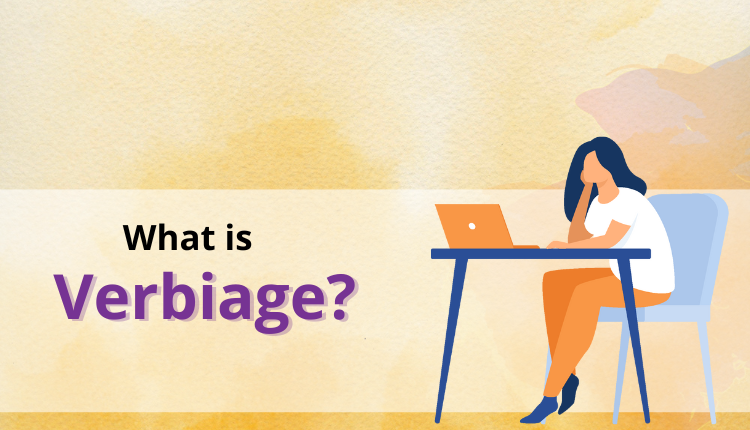Language evolves, and how we use it impacts communication clarity. Sometimes, over-explaining simple ideas leads to confusion. In this post, we’ll explore the meaning of verbiage, its proper use, synonyms, and examples. We’ll also discuss how tools like Trinka Grammar Checker help eliminate unnecessary verbiage to improve writing.
Definition
Verbiage is a redundant or excessive use of words in speech or writing. It is derived from the French word verbiage, which means “verbosity” or “wordiness.” Language exists to convey thoughts clearly; excessive verbiage only obscures the message. As mentioned, verbiage is where someone uses many words to say something that can be said more concisely. It often occurs involuntarily, especially when people try to talk more formally or professionally but end up making their message more complicated rather than less.
How to Use Verbiage
Proper use of words means recognizing when wordiness is required and when it interferes with clarity. Although there are some instances where detailed explanations are necessary, there are plenty of others that could do with less. Some of the crucial points to remember are:
- Avoid Redundant Words – Repetition of the same words in a different way may dilute the impact of a statement. For example, “The ultimate outcome of the project was successful” can be made more concise as “The project was successful.”
- Be Brief – Shorter sentences have greater impact. Instead of using, “Due to the fact that,” use simply “Because.”
- Know Your Audience – If you are writing a technical report, there will have to be some degree of complexity. But if you are writing for the general audience, use plain and simple language.
- Use Active Voice – Active voice tends to be more concise and engaging than passive voice. “The team completed the project on time” is more precise than “The project was completed on time by the team.”
- Avoid Filler Words – Filler words such as “basically,” “actually,” “really,” and “very” rarely add anything to a sentence. Removing them can make it more understandable.
Verbiage in a Sentence
For better understanding of verbiage, let’s take some examples of excessive and lavish usage:
- Excessive Verbiage: “It is of great importance that each and every one of the members in the department be there at the meeting scheduled to be held on Friday.”
- Concise Alternative: “All the members of the department have to attend the meeting on Friday.”
- Excessive Verbiage: “Currently, we are experiencing a lack of supplies needed in the production process.”
- Concise Alternative: “We are experiencing a production supply shortage.”
Synonyms of Verbiage
Synonyms of verbiage enable a person to recognize and remove excess words when speaking or writing. Some of the most used synonyms are:
- Wordiness – Expressing more than required.
- Redundancy – Needlessly repeating something.
- Circumlocution – Talking about something instead of directly.
- Loquacity – Talking too much, often without substance.
- Verbosity – A formal term for talking too much.
Examples of Verbiage in a Sentence
Following are some everyday examples where verbiage can be seen and rectified:
- Before: “The committee members were in agreement with each other on the final decision that was reached.” After: “The committee members agreed on the final decision.”
- Before: “The weather conditions that prevailed at the time were very unfavorable.” After: “The weather was very unfavorable.”
- Before: “Because there was a misunderstanding, the signing of the contract was delayed.” After: “Because of a misunderstanding, the signing of the contract was delayed.”
By removing unnecessary words, the message is clearer and easier to understand.
How Trinka Grammar Checker Can Help
Trinka Grammar Checker is a good tool for any person who would like to correct their writing. Not only does it point out grammatical errors, but it also provides advice on how to make the writing clearer and concise, which is important when the verbiage definition is also considered.
With Trinka, you can remove words that are unnecessary and make your sentences shorter. Your message is delivered neat without so much wording. Whether you are drafting an email or creating a report, Trinka allows you to choose the right words quickly.
Conclusion
Verbiage, or wordiness, makes communication unclear and difficult to comprehend. Knowing its definition, being able to identify when it occurs, and being concise in the use of words, writers and speakers can improve their skills in communication. Whether by self-proofreading or using AI software like Trinka Grammar Checker, the removal of unwanted verbiage enhances reading and communication.
Keep in mind that the secret to effective communication is not in the quantity of words, but in the quality of how those words communicate.

